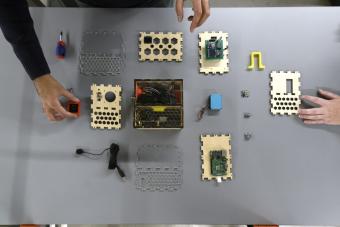The Whole Communities–Whole Health team is building and testing a smart device that uses environmental sensors to better understand how indoor air quality affects family health by measuring indoor air pollution, carbon dioxide levels, humidity, and temperature in real time. Additionally, the team will develop an algorithm to understand the quantity and quality of human interactions based on the noise levels in the home.
At several stages in the design process, the engineering team has shared its progress with members of the Community Strategy Team. Feedback from the team led to the development of an “off” switch so participants can control when and how they participate in the study. The design team also added a personalized “counter” so families can record their own personal health goals, like keeping track of how many glasses of water they drink each day.
Progress and Results: The latest generation of the Home Beacon has been developed, tested, and calibrated through the efforts of many team members and is now able to reliably monitor a person's indoor environment. The Home Beacon has been deployed in two separate cohort studies in 2020 and we hope to combine the data from the Home Beacons with those from other devices to see how a person's indoor environment might influence a person's mood, activity, and/or sleep quality.


Smart Home Beacon
UT researchers design and assemble a smart home beacon for the Whole Communities–Whole Health grand challenge.
Team Members
Christine Julien
Videos
Select Publications
H. Fritz, S. Bastami, K. Kinney, S. Schnyer, Z. Nagy, Exploring the relationship between multiple indoor air pollutants and sleep quality in university students, Indoor Air 2020, Seoul, South Korea, November 2020 (poster, accepted)
H. Fritz, K. Kinney, Z. Nagy, Ecologically Valid, Multimodal Data Collection, BuildSys 2020, Yokohama, Japan, November 2019 (poster, accepted)

